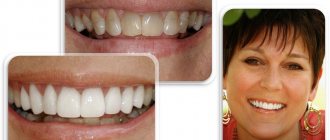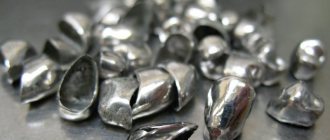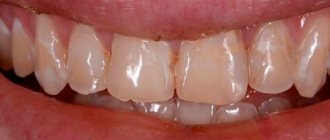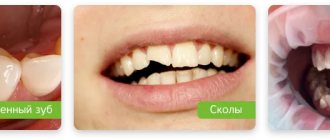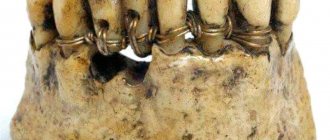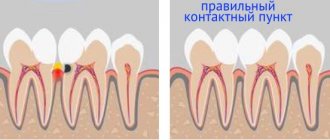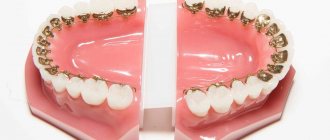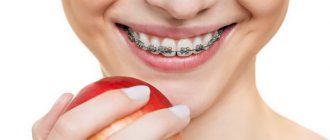Malocclusion is a common pathology that is diagnosed in both childhood and adulthood. Bite correction is a long, complex process, as a result of which the patient receives a healthy and beautiful smile. It is a mistake to believe that malocclusion is solely a problem of appearance, since it generally has a detrimental effect on the condition of the dental system. Malocclusion is associated with dysfunction of the temporomandibular joints, inflammatory gum diseases, and an increased risk of dental caries due to difficulties in hygienic care.
The most popular method of combating malocclusion in modern dentistry is to install braces on the patient. There are several main types of braces on the market, each of which is effective for correcting malocclusion, but has its own nuances of use. Of the budget options, dentists most often recommend metal or ceramic braces. In this regard, many are interested in which braces are better, ceramic or metal. Both options cope well with their main function - bite correction, however, there are some nuances in wear and appearance that must be taken into account when choosing.
Content:
- Features of metal braces 1.1. Pros and cons of metal devices
- Features of ceramics 2.1. The most modern ceramic devices for correcting bites
- What are the similarities between both types of braces?
- Main differences between metal and ceramics
- Is there a compromise?
Today, orthodontists have many modifications of brace systems in their arsenal, differing in a number of parameters.
Since most patients want to correct their bite while maintaining an attractive appearance of their smile, the material from which it is made comes to the fore when selecting an alignment structure. According to statistics, most often clients of dental clinics choose ceramic or metal braces. Let's try to figure out why these devices are in high demand and which ones are better.
Features of metal braces
Metal devices are rightfully recognized as the most reliable and durable. They have a budget price that doesn’t hit the consumer’s wallet so hard, and they do an excellent job of their functions. But there is one “but” - they don’t look attractive at all.
To improve their appearance, developers began to use alloys with a special Teflon coating in the production process. The latter gives the device a light tint, making its elements less noticeable to others.
Metal devices can be:
- ligature;
- self-regulating.
The first ones are presented in a rich range of colors, so teenagers love to experiment with them. When wearing them, you need to visit the orthodontist approximately once every 1-3 months. The duration of bite correction takes up to two and a half years.
Self-adjusting devices are smaller than ligature ones, but their locks are thicker. They are easier to care for. They usually cost more.
Pros and cons of metal devices
A person studying the features of ceramic and metal braces is usually interested in the advantages and disadvantages of these types of systems.
In this case, the advantages include:
- very reliable fixation;
- resistance to all types of food dyes (do not stain);
- the ability to quickly correct existing crooked teeth;
- low risk of breakdowns;
- smooth surface, pleasant to the touch;
- decent hygienic characteristics;
- reasonable cost.
The disadvantages of metal devices are:
- not very beautiful appearance, due to which the patient may experience psychological discomfort;
- may cause allergies if a person has individual intolerance to metals.
When should correction begin?
Braces are considered one of the most popular dental structures for correcting malocclusion. Indications for installing braces are determined by the dentist after diagnostics, during which a malocclusion or other problems that require special correction may be detected. The main indications are:
- Different types of malocclusion. Malocclusion is not always pronounced; in many patients it is diagnosed during an examination for another reason and does not cause any concern in everyday life. However, proper correction can improve the appearance of the smile in cases of mild problems, while in cases of significant problems, installing braces is one of the most affordable treatment options.
- Dystopia of teeth. If the position of one or more teeth in the dentition is disturbed, then the braces system will correct this deficiency over time.
- Presence of gaps between teeth. Gaps between teeth are an unpleasant aesthetic defect that can be easily corrected with braces.
- Crowded teeth. If teeth are too close to each other, this makes oral hygiene difficult and contributes to the development of caries.
- Disproportion between the upper and lower jaws. During development, the disorder may occur due to bad habits such as thumb sucking, the child's habit of pulling and gnawing hard objects.
If there are medical indications, the dentist recommends that the patient choose one of the options for modern braces and begin preparing for treatment.
Features of ceramics
Ceramic devices were created specifically for patients who are accustomed to having a perfect smile. In color they almost completely match the enamel, so they are hardly noticeable to others.
Like metal analogues, they come in:
- ligature - fixed on the front surface of the dentition;
- non-ligature - adjustable using special clips.
Among the undeniable advantages of ceramics, orthodontists name:
- excellent hygiene;
- good aesthetics;
- absence of bulky locks;
- sufficient strength.
They do not provoke allergies, and therefore are an ideal solution for allergy sufferers.
At the same time, they are less durable than metal ones, and break more often; they can be painted with food coloring. They are larger in size than metal ones. They cost more.
The most modern ceramic devices for correcting bites
Damon Clear ceramics are in high demand among patients today. Its distinctive feature is one hundred percent resistance to pigmentation. Reflection devices from Ortho Technology have also proven themselves well. They are made from special aluminum oxide polycrystals and do not leave stains on tooth enamel or cause discoloration.
The Mistique GAS designs are considered a worthy option. They are coated with silicon oxide, and therefore also do not absorb coloring particles and maintain the natural color of the enamel.
Combined systems
There are also systems more complex in design and functionality used in dentistry. We are talking about hybrid or combined orthodontic brackets, for example:
- lingual-vestibular;
- metal-ceramic;
- metal-sapphire;
- ligature-self-regulating, etc.
There can be many such combinations. Braces systems are constantly being modernized and becoming more and more functional. Hybrid designs can combine aesthetics, versatility, reliability, strength, etc. But they require large financial investments from the patient and high professionalism from the dentist.
It is worth remembering that the effectiveness of treatment is determined not only by the type of structure. Much depends on how a person cares for his teeth and braces. To keep them intact and prevent the development of caries, you must adhere to a number of recommendations:
- stop smoking and alcohol;
- buy a special brush and brush for berkets;
- use dental floss and irrigators;
- limit your consumption of sweets;
- give up solid foods;
- Avoid sticky foods and drinks with dyes.
When purchasing toothpastes, mouthwashes and other hygiene products, choose products that are recommended for orthodontic treatment.
What are the similarities between both types of braces?
Both devices cope perfectly with their main function - eliminating even severe tooth curvature. Both metal and ceramics cannot be installed if:
- untreated caries;
- the presence of deep cracks on the enamel surface;
- the presence of implants, crowns, bridges;
- oncology.
Both systems cause discomfort during the adaptation period. After each successive tension of the arch, a person experiences pain for several days.
Main differences between metal and ceramics
If we compare the described products with each other, then we need to focus on four main factors:
- Reliability. According to this criterion, metal devices win.
They can easily withstand any mechanical stress, so they remain intact throughout the entire treatment period. Ceramics is inferior in strength, but when used correctly (if the patient strictly follows all medical recommendations) it also wears quite well. However, it is not recommended for professional athletes to install it. - Appearance. Ceramic braces are unnoticeable. They almost match the natural color of the teeth, so they are suitable for people who lead a public lifestyle and speak in public. Metal does not look as aesthetically pleasing and creates a pronounced contrast on the dentition. However, if you plan to use it, you can ask the orthodontist to use arches that are fixed on the inner surface of the teeth. But they are so expensive.
- Price. Ceramic devices are inferior here - they are more expensive, so not every patient in a dental clinic can afford such treatment. Metal has a more reasonable price. This is its main advantage.
- Convenience. According to user reviews, ceramics cause slightly less discomfort. Therefore, if a person has a low pain threshold, he should give preference to braces made of this material.
In any case, the final decision must be made together with your doctor. After all, the main goal of orthodontic therapy is to give certain teeth the correct position. And the emphasis in this situation should no longer be on beauty, but on functionality and a guarantee of obtaining the expected result in the shortest possible time.
Metal constructions
This is a classic version of braces that was invented more than 100 years ago, but is still popular. Among the main advantages are:
- system efficiency. The technology of working with metal braces has been proven and has proven its effectiveness over time. The outcome of treatment is easy to predict and treatment can be controlled;
- Durable design does not require strict diet or delicate handling. The chewing load in most cases remains unchanged, which is suitable for patients who do not want to change their habits;
- ease of maintaining oral hygiene. With braces installed, you need to brush your teeth after every meal using various brushes, but if you compare the care of orthodontic structures made of other materials, then in the case of metal it is easier;
- low cost and availability of treatment;
- the ability to eliminate the risk of allergies with proper selection of metal alloys.
However, metal braces are not without their disadvantages. Among the disadvantages are:
- unaesthetic appearance. Yes, the metal vestibular structure stands out strongly against the background of white teeth during a conversation or when smiling, but if the budget is strictly limited, then you will have to put up with this;
- discomfort on the mucous membrane in the mouth, however, discomfort can also occur with other materials. In most cases, patients need some time to fully adapt to the irritant.
Smile aesthetics when choosing metal braces can be completely eliminated if the patient chooses lingual braces. They are attached to the inside of the tooth and are completely invisible. However, this is not without its drawbacks: the high cost of making custom-made braces, impaired diction during the adaptation period.
If you choose between ligature and self-ligating braces, only an orthodontist can give recommendations. In this case, the degree of the defect and the timing of correction are taken into account.
Is there a compromise?
For clients who can’t decide whether to choose ceramic or metal braces, dentists today can offer a compromise option. Its essence is to install ceramic devices on the teeth located in the smile zone, and metal ones on all others.
This combination allows you to make the cost of orthodontic treatment more affordable, preserve the aesthetics of your smile and obtain excellent therapeutic results.
Remember: braces are just a tool in the hands of a doctor. An experienced doctor knows how to eliminate a patient’s defect using different types of devices. But he offers exactly those that will make your smile more attractive more quickly and less traumaticly. Therefore, trust your doctor and strictly follow all his instructions. By following this rule, you will correct your bite very quickly.
